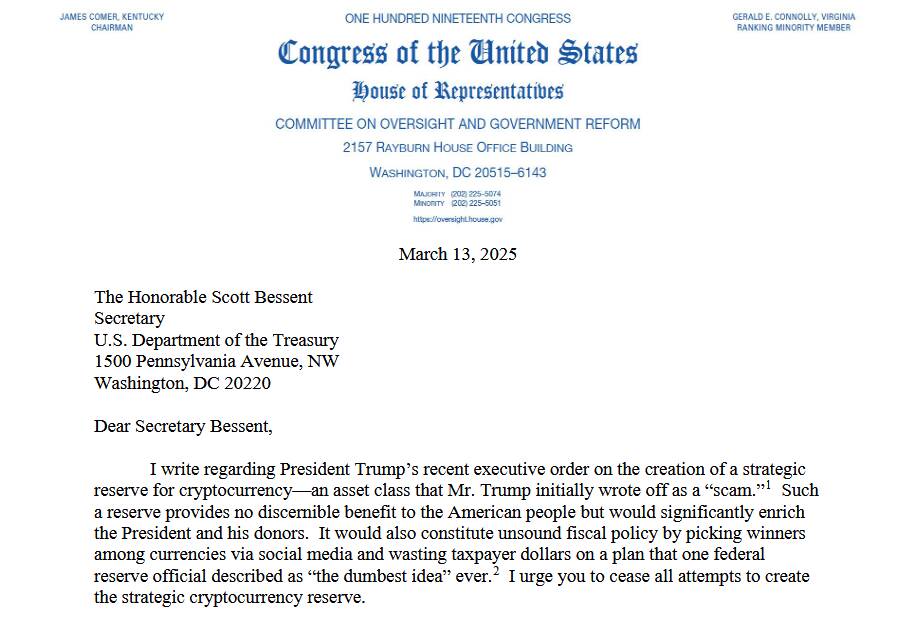A recent development in the cryptocurrency landscape has stirred political waters in the United States, with a prominent Democrat lawmaker calling for the US Treasury to abandon plans for a strategic cryptocurrency reserve. House Representative Gerald E. Connolly of Michigan voiced his concerns in a letter addressed to Treasury Secretary Scott Bessent, claiming that the proposed reserve—often associated with former President Donald Trump—would serve no real benefit to American citizens and could serve the interests of Trump and his supporters instead.
In his March 13 correspondence, Connolly highlighted that this initiative lacks a strategic need and risks deploying taxpayer money in a highly speculative cryptocurrency market. He referred to suggestions that a stockpile of cryptocurrencies, particularly Bitcoin, would be better served as a hedge for speculators facing potential losses as “unsound fiscal policy.” Connolly’s criticisms underscore a growing skepticism regarding the viability and ethical implications of such a reserve.
“No strategic need has arisen that would necessitate investment in the volatile and speculative cryptocurrency market,” Connolly stated. “It would constitute nothing more than a highly speculative taxpayer-backed hedge to provide bitcoin speculators the assurance that when the crash comes, the State will deploy this fund to rescue it.”
Connolly’s concerns are further amplified by allegations of conflicts of interest involving the Trump Organization and its ownership of the crypto platform World Liberty Financial, coupled with the existence of the Official Trump memecoin. The Representative labeled this token a potential “money grab,” noting that entities connected to Trump may have reaped over 0 million through trading fees associated with it. These remarks were echoed by fellow Democrat Maxine Waters, who condemned the TRUMP token for embodying the “worst of crypto.”
The White House has attempted to clarify its position, indicating that the Digital Asset Stockpile would only handle cryptocurrencies already forfeited to the government, and budget-neutral methods would be employed to make acquisitions. However, Connolly emphasized a lack of congressional consultation or authorization for these plans, raising further questions about transparency and governance in the burgeoning realm of digital assets.
Connolly emphasized the need for clarity, asking Bessent for documentation related to the Bitcoin reserve’s creation and details on possible conflicts of interest affecting the administration’s decisions regarding cryptocurrencies.
As discussions unfold, the proposed Strategic Bitcoin Reserve and the Digital Asset Stockpile continue to face scrutiny, reflecting broader debates over the role of government in regulating and engaging with the cryptocurrency market.
Concerns Over Proposed Strategic Crypto Reserve
The recent call from Democrat lawmaker Gerald E. Connolly to halt the creation of a strategic cryptocurrency reserve raises several important points regarding its implications for the American public and the overall integrity of fiscal policy.
- Conflict of Interest:
- Concerns regarding potential conflicts between Trump’s presidency and his organization’s ownership of World Liberty Financial.
- Allegations that Trump’s cryptocurrency ventures could financially benefit him and his donors rather than the average American citizen.
- No Tangible Benefits:
- Criticism that the proposed crypto reserve offers “no discernible benefit” to the American people.
- Claims of substantial taxpayer dollars wasted on speculative investments.
- Political Implications:
- Connolly’s assertion that Trump’s plans denote “unsound fiscal policy” by favoring certain cryptocurrencies.
- Concerns voiced by Representative Maxine Waters regarding the risk of crypto market exploitation through schemes like the TRUMP memecoin.
- Lack of Oversight:
- Claims that Trump did not consult Congress or seek authorization for the Bitcoin reserve plan, raising governance questions.
- Requests for transparency regarding Treasury communications about the Bitcoin reserve and its potential conflicts.
- Market Speculation Risks:
- The proposal involves investing in a “volatile and speculative cryptocurrency market,” which could have negative consequences if values crash.
- Potential misuse of taxpayer funds to bail out cryptocurrency investors during market downturns.
“No strategic need has arisen that would necessitate investment in the volatile and speculative cryptocurrency market.”
These aspects of the proposed cryptocurrency reserve are critical to understanding both the potential financial impact on taxpayers and the political integrity of government actions regarding digital assets.
Debate Heats Up Over Strategic Crypto Reserve Proposal
The ongoing discourse surrounding the proposed strategic crypto reserve in the United States is stirring significant controversy, particularly among lawmakers. Representative Gerald E. Connolly’s recent letter to Treasury Secretary Scott Bessent has thrown a spotlight on potential conflicts of interest and fiscal soundness, raising critical questions about the administration’s motives. This discussion mirrors similar controversies in past cryptocurrency initiatives, where politics and economics intertwine in complex ways.
Competitive Advantages: Advocate supporters of a strategic reserve assert that it could enhance national economic resilience and position the U.S. as a leader in digital asset governance. By controlling and managing these volatile investments, proponents argue that the government can stabilize the crypto market in times of crisis. Additionally, if structured correctly, it could offer a new revenue avenue without directly impacting taxpayer dollars.
Competitive Disadvantages: Conversely, the critics, including Connolly, emphasize that such a reserve may disproportionately benefit affluent individuals and their enterprises, particularly those connected to Donald Trump. The argument that this initiative lacks a clear and tangible benefit for the general public raises valid concerns. The skepticism towards the initiative also reflects broader distrust in how government officials manage public finances, especially when conflicts of interest come into play.
This current debate can create challenges for those on both sides of the political aisle. For the Republican supporters of the reserve, any perceived impropriety could undermine public trust and erode support among constituents wary of potential corruption. On the flip side, the Democratic opponents, especially those like Connolly and Maxine Waters who criticize the administration’s financial decisions, risk alienating constituents who may see cryptocurrency as an innovative financial tool—potentially causing political friction within their ranks.
Ultimately, this discussion has far-reaching implications: if a strategic crypto reserve does come to fruition, it may set a precedent for future governmental involvement in an already speculative financial sector. Conversely, if it is perceived as politically motivated or lacking transparency, it could lead to increased skepticism towards cryptocurrency initiatives as a whole, alienating enthusiasts and investors alike.















